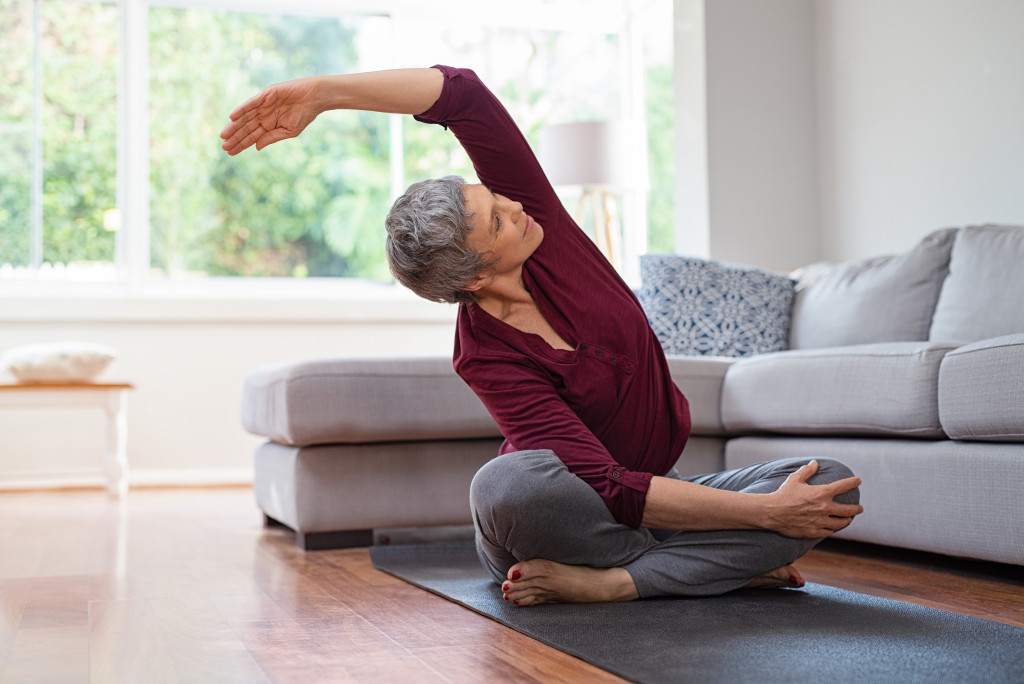- Older women in their 60s are prone to various health concerns.
- They must pay attention to their bone health by exercising regularly, eating a healthy diet, and avoiding smoking.
- There are also assistive devices that can be installed in homes.
- They should reduce their risk of heart disease by maintaining a healthy weight, exercising regularly, and avoiding smoking.
- They should engage in mentally stimulating activities regularly to reduce the risk of Alzheimer’s disease.
As you age, your body goes through many changes. For women, these changes can be especially pronounced during menopause. Menopause is a time when a woman’s body stops producing eggs, and her menstrual periods become irregular. This transition usually begins around the age of 51, but it can start as early as 40 or as late as 60.
While menopause is a natural process, it can also be accompanied by some not-so-pleasant symptoms, including hot flashes, night sweats, mood swings, weight gain, and vaginal dryness. Also, older women are at increased risk for certain health conditions, such as osteoporosis, heart disease, and Alzheimer’s. Fortunately, there are things that women can do to protect their health during this time of change.
Bone Health
As women enter their 60s, they must pay attention to bone health. After menopause, the body stops producing estrogen, essential for maintaining healthy bones. This can increase the risk of osteoporosis and other bone-related conditions in older women. Age-related changes like weight gain and lack of exercise can also contribute to weak bones.
Osteoporosis
Osteoporosis is a condition that causes bones to become weak and brittle. It is most common in older women, particularly those who are postmenopausal. There are several things that women can do to reduce their risk of developing osteoporosis, including getting regular exercise, eating a healthy diet that includes plenty of calcium and vitamin D, and avoiding smoking. Additionally, older women should talk to their doctor about taking bone-strengthening medication such as bisphosphonates.
Rheumatoid Arthritis
Rheumatoid arthritis (RA) is an autoimmune disorder that affects the joints, causing inflammation and swelling. The disease can affect anyone at any age, but it is more common in women over the age of 60. RA causes inflammation of the joints and surrounding tissues, leading to pain and stiffness. The symptoms can range from mild to severe, making it difficult for older women to stay active and mobile. Treatment options for RA include medication and lifestyle changes such as exercise and stress management. There are also assistive devices, such as lift chairs for the elderly, families can install in their homes.

Heart Health
The risk of developing heart issues comes with age for women due to several factors, including menopause, weight gain, and changes in blood pressure and cholesterol levels. Additionally, older women are more likely to have diabetes and high blood pressure, which can contribute to heart disease.
Heart Disease
Heart disease is the leading cause of death for women in the United States. Luckily, there are things that women can do to reduce their risk of developing heart disease. These include maintaining a healthy weight, exercising regularly, eating a healthy diet, and avoiding smoking. Additionally, older women should talk to their doctor about whether they should take aspirin every day to help prevent heart attacks and strokes.
Brain Health
As women age, the risk of developing certain neurological diseases, including Alzheimer’s disease and dementia, increases. Additionally, with age comes a natural decline in brain functioning, such as memory and cognitive speed.
Alzheimer’s Disease
Alzheimer’s disease is a type of dementia that causes problems with memory, thinking, and behavior. While it is most common in older adults over the age of 65, it can also occur in younger adults. There are several things that women can do to reduce their risk of developing Alzheimer’s disease later in life. These include staying physically active throughout life, eating a healthy diet with plenty of fruits and vegetables (especially those with antioxidants), and engaging in mentally stimulating activities regularly (such as reading or doing puzzles). Older women should also talk to their doctor about medications such as cholinesterase inhibitors or memantine to help prevent Alzheimer’s disease or delay its onset.

Self-Care Tips
Older women can take care of themselves in a variety of ways. First and foremost, they need to get regular check-ups with their doctor. These check-ups should include tests for breast and cervical cancer, diabetes, cholesterol levels, and blood pressure. Additionally, older women should make sure they get enough exercise. Regular physical activity can help reduce the risk of developing heart disease, stroke, osteoporosis, and cancer. It can also improve mental health, cognitive function, and energy levels.
Older women should also eat a healthy diet with plenty of fruits, vegetables, whole grains, and lean protein. And lastly, they should make sure to get enough rest. A good night’s sleep can help improve mental alertness and reduce the risk of depression. Overall, older women should take steps to ensure they stay healthy during their golden years. They can enjoy a long life filled with health and happiness with proper care, attention to diet and exercise, and regular doctor visits.
Bodies inevitably change—some changes can be accompanied by unpleasant symptoms or put us at increased risk for certain health conditions. However, there are things that we can do to protect our health during this time of change. By maintaining a healthy lifestyle, you can help improve your chances of staying healthy well into your golden years!

